Author: Hasib Bahesh
Hasht-e-Subh has obtained Taliban’s final scheme for the modification of school curricula. The Pashto version along with its Farsi translation has already been published by Hasht-e-Subh. According to this scheme, the process has been finalized in December 2020 by the Taliban’s assessment board for modification of education curriculum. This committee was mandated by the Taliban’s Education and Higher Education Commission. The appointed board has finally shared its recommendations in 26 paragraphs with the Taliban leadership. In the report, in addition to removing several textbooks and subjects from the education curriculum, many suggestions have been raised that will change the content of the textbooks to a great extent, making the curricula similar to the previous rule of the Taliban in the late 1990s. Removing the images of all living beings, propagating Jihad, justifying violence, bloodshed and destruction, prohibiting any advocacy for democracy and human rights, opposition to women’s education and freedom, propagating the Taliban’s narrative of history, focusing on the Islamic world and ignoring the non-Islamic world, especially the West, are among its main recommendations and suggestions. Scrambling to alienate Shiites, demonizing the United Nations, banning the celebration of Nowruz, introducing restrictions on parties and ceremonies, and condemning some personalities including Amanullah Khan, Faiz Mohammad Kateb Hazara, and Abdul Ghani Khan, a Pashto poet, are some of the other points that the Taliban have addressed in this modification scheme. This document becomes public while the Taliban have repeatedly announced the replacement of an Islamic curriculum instead of the current education curricula, repeatedly calling it the need of education centers in Afghanistan.
An education curriculum is a standard-based sequence of planned strategies, subjects, vocabulary, textbooks, facilities and practices that are implemented in order to achieve the intended goals in education. In an assessment of the curriculam from 1388 to 1393 (2009-2014) by the Curriculum Deputy of the Education Ministry of the former government, the education curriculum has been addressed to as a ‘national guarantee’ and a ‘valuable document’. “Every citizen has the right to share his/her concerns and recommendations and make us aware of its shortcomings with constructive criticism. Any propaganda and any political treatment of this national document is not only a denial of the truth, but also an insincere treatment of critical national issues” the official document reads. This institution has implicitly denounced such actions and expresses hope that conscientious citizens will deal with valuable national issues carefully and thoughtfully.

The U.S. Special Inspector General for Afghanistan Reconstruction (SIGAR) also announced Taliban’s decision to re-design their own education curriculum in its February report. SIGAR has mentioned the removal of some textbooks and the inclusion of ideological subjects. In response to SIGAR’s report, the U.S. State Department stated that there is no document to prove Taliban’s intention to change Afghanistan’s education curricula. Taliban further confirmed that the school curriculum may change in the coming year. Noorullah Munir, Taliban’s Education Minister, also said in late October 2021 that the curriculum will change and the revised curriculum will be in accordance to the Taliban’s interpretation of Islam.
Now, the official Taliban scheme regarding the modification of education curriculum reveals that after reviewing the textbooks based on the Taliban’s interpretations of religion, the task force demanded to make modifications in the content of the education curriculum to a great extent. According to the Taliban, this change in the curriculum will strengthen the ideology of the Taliban among the future generations. In their evaluation, they have repeatedly pointed out the quality of the content of the curriculum and its effectiveness on the minds of the public, especially the future generation. According to the Taliban, maintaining the current curriculum is the continuation of the alleged ‘cultural invasion of the West’ which endangers the interests of the Taliban. This is why the changes proposed by the Taliban are very extensive. These changes have been proposed in the existing curriculum to be taught during a transition period, until the Taliban’s preferred curriculum is compiled. Some subjects are prohibited, and the ones that have not been removed, certain titles and topics have been removed from them. Teachers have been ordered to condemn the non-Taliban values and concepts contained in the textbooks while teaching, and promote the Taliban’s preferred contents. Taliban have not revealed the identities, academic backgrounds and scientific qualifications of the board members in this document. But from the content of the report, it can be understood that there was no place for education specialists and pedagogy experts in the composition of the board.
When Did the Curriculum Modification Begin and With What Principles?
After the Doha agreement between the U.S. and the Taliban in 2020, the Taliban started to revise the school curriculum. In this process, Pashto and some Dari textbooks have been used, which include 45 elementary school textbooks, 48 secondary school textbooks, and 43 high school textbooks. The Taliban have evaluated the textbooks by a board they call ‘technical’, assuming that the previous government was a puppet. According to the Taliban, since the curriculum was compiled and issued by the Republic with the financial assistance of foreign countries, some ‘non-Islamic and non-Afghan standards similar to the western world’ have been included in it. In the introduction, they admit that the curriculum of the past 20 years has an Islamic appearance, but ‘ugly superstitions’ have skillfully been included in it under the title of Islam. By ugly and superstitious, they mean democracy, equality, women’s rights, civil liberties, tolerance, mutual acceptance, non-violent measures and other values that are not compatible with their own ideology.
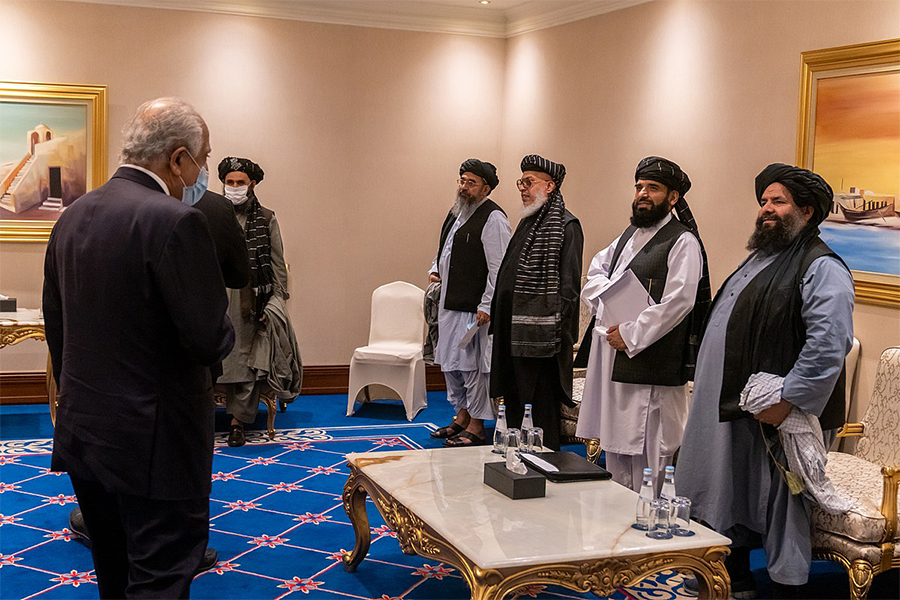
Although it is not clear when the assessment process started, but the report in question has been finalized at the end of November 2020. From the date on the report, we can infer that the Taliban worked on changing the education curriculum after the Doha agreement in February 2020. At that time, Taliban’s spokesperson also announced the beginning of their commissions on various issues, including high school and higher education. Apparently, the Taliban were confident of returning to power at that time that they immediately started changing the curriculum.
The report states that the Taliban board have determined 12 principles in their agenda for evaluating the education curriculum. First, this board points out the cases that according to them have obvious ideological, religious, and problems. The committee has evaluated the curriculum based on principles that are opposing the customs of Afghanistan, praising other countries’ culture, praising Western and Eastern figures instead of Muslim figures, trying to promote ‘non-Islamic customs’, contradicting the independence and freedom of the country, insulting Taliban values, calling opponents of the Taliban heroes, respecting democracy, ignoring the history and geography of Islam and ‘turning a blind eye to the facts.’
This 78-page report has been prepared in two sections: 1) general issues and considerations, and 2) specific and personal recommendations. After the investigations, the Taliban committee has listed 26 general recommendations in this evaluation. These considerations completely change the curriculum. This report also states ‘In the light of the above principles, we mention some important and general issues that are significant in the current situation and have been misused in all the curriculums, as general considerations.’ At the end of the proposal, every consideration along with the proposed change is attached.
Moreover, in the personal recommendations section, issues are listed that will change the education curriculum of Afghanistan to a great extent.
Which Textbooks Will Be Removed from the Curriculum?
In this proposal, the Taliban committee has removed three subjects; these subjects are visual arts, civil education, and culture from the curriculum. The art textbook was included in the curriculum in 2017. This textbook is taught from 1st through 9th grade; the subject introduces children to working with brush, pencil and colors. It also aims to motivate the children to be creative through painting, drawing, and sculpting. In their assessment, the Taliban conclude that art is an elective, thus studying it is not required. This board has said “Almost all of its themes [painting and art] are useless. Studying agriculture is proposed as an alternative to it. There is no problem in canceling it. Therefore, the alternative should be taught.”
The civil education text book was also added to the curriculum in 2017. This textbook is taught to middle and high school students, grades 7 through 12. The civil education textbook teaches civil rights to familiarize children with the human and civil rights of themselves and their fellows. The contents of this textbook includes issues related to the governance, democracy, the United Nations, and human rights. However, the Taliban do not agree to continue teaching it in schools. The committee argues “From 7th to 12th grade, all these textbooks contain topics that are mostly harmful or useless and are the result of democracy; such as the introduction to institutions, democracy, the constitution, human rights, elections, the national police, etc. Since these textbooks are mandatory, it is necessary to teach the negative impacts of these things to the students.” As a result, the Taliban have emphasized the removal of this subject. Yet, they have agreed that its content is important, but instead of discussing democracy and human rights, their negative impacts should be taught to students, based on the Taliban’s interpretation of sharia.
The third subject proposed to be removed from the education curriculum is Culture. This subject was introduced in 2011; it aims to teach culture, customs, and traditions specific to the Afghan society. The book for this subject became controversial in 2020 after people protested that Afghanistan’s only Olympic medalist, Rohulla Nikpa’s photo was not printed in the book. His name was mentioned, but instead of his photo, other athletes’ photo was printed. Finally, the Ministry of Education stopped teaching this topic in the same year and said that the book will be reprinted. When reviewing this textbook, the Taliban committee say “This topic is optional, and not necessary to study. It will be good if another useful topic is taught instead.”

Removing Images of Living Beings, Statues, and Official Clothes
In the revision of the education curriculum, Taliban have emphasized on complete removal of images of any kind of living being and statues. The revision committee has said that pictures of humans have been used in all textbooks. According to the Taliban, ‘there is a lot of corruption in these images and the previous regime used these images to distort students’ mentality.’ In addition to the spiritual images, the Taliban’s evaluation includes the images in school uniforms, which the group believes are ‘western, illegitimate, and non-Afghan’. This committee believe that even the pictures of official clothes [suits] and the judges’ attire are not allowed; because they promote foreign culture. Also, pictures of young girls, which the Taliban believe are ‘non-Islamic and non-Afghan act to encourage corruption’.
Girls
In one case, members of this committee criticize the inclusion of pictures of men and women in sports and called it ‘semi-nude’. In the 7th grade’s math textbook, pictures of children playing football are defined as being almost naked. Another picture is of girls in school uniforms, they wear black dresses and pants with white scarves and are present inside a classroom. One of the pictures criticized by the Taliban is of a girl wearing a traditional Afghani dress and a chador.

In the English textbooks, the Taliban revision committee insist on removing or covering the cover image of the book so that the images are removed or at least paper is pasted on it. This picture shows a child wearing a scarf and sitting on a school chair. In an interesting case, members of this committee criticize an image of the anatomy of the human body in the 8th and 9th grade biology textbooks and demand its removal. It is not clear how teachers will teach students the nature and functions of human body parts by erasing these pictures.

Furthermore, pictures of musical instruments in textbooks are an attempt to encourage students to sing, which the Taliban believe is illegal and rejected. They also think that pictures of Attan, the traditional Afghan dance, encourages students to commit ‘illegal and inhuman acts’. According to this committee, the pictures with shaved heads and trimmed beards are western, prohibited and an attempt to encourage students to commit haram, known as forbidden acts, or at least get used to them. In another case, it has been said that the images with a sharia appearance (beard and turbans) are drawn in such a way as to show poverty, intoxication, or an inappropriate state. In all these cases, the committee emphasize complete removal or at least covering these images.
Special Emphasis on Bloodshed and Destruction
The Taliban’s report shows that the main goal of revising the curriculum is to replace the extremist views of the Taliban in the textbooks. In many cases, members of the revision committee have proposed the curriculum materials in such a way that the main topics of the textbooks are to maintain and expand the ideological interests of the Taliban. One of the issues in the education curriculum that the Taliban have seriously demanded to change is the definition of peace and war. They are not satisfied with the encouragement of students for peace in the curriculum, and they believe that in the textbooks, peace has been given a western interpretation and Jihad has been given the name of war. The committee states that the teacher should remind students of peace under the rule of religious systems. Also, according to them, in current textbooks, civil wars are called Jihad, an attempt that undermines the ‘real Jihad’ as the cause of the destruction of the country. The Taliban refer to their own war against the U.S., as well as the previous wars against Great Britain and the Soviet Union as real jihad.
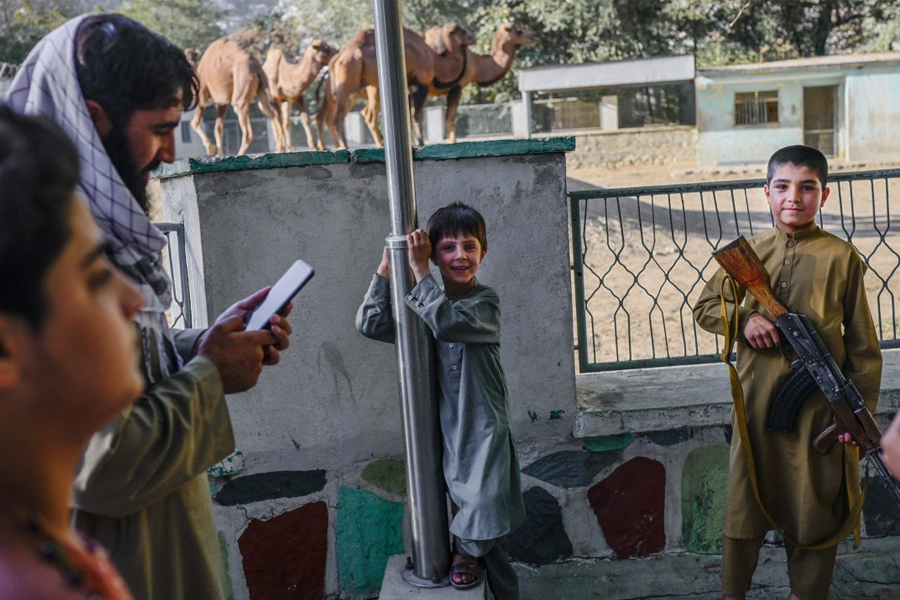
The committee has said that the rules of Jihad should be included in the curriculum, so that children are encouraged to fight. In the evaluation, it is stated that the essence of the concept of Jihad is fighting with a sword, while they believe that the curriculum removes such a concept from the minds of students. The Taliban have stated that the war against the countries present in the Islamic State is a mandatory obligation, but if they do not enter the Muslim territory, it is optional. They have reminded that instead of including the losses of war, teachers should highlight the difference between unjust war and jihad, its assumptions, importance, and necessity for students. It has also been pointed out that students should be taught about the rewards of breeding horses during Jihad. According to this committee, instead of financial and human losses of past wars, the religious and worldly benefits of past jihads should be explained in the curriculum. They criticize the definition of terrorists, which is mostly associated with their own name, and remind that the West misuses this name to deceive Muslims.
The Taliban have also objected to topics about the sanctity of Muslim blood in the education curriculum and state that in these lessons, the sharia rules of killing in war, retaliation in kind, stoning, and other cases should be explained. In this way, the war in the curriculum is so valuable for the Taliban that according to them, the term “Ghazwa Maiwand” should be used instead of Maiwand war in the history of the 12th grade. Even in evaluating a lessons in the 7th grade Islamic education textbook, it is emphasized to include some points about the permissibility of shedding Muslim blood.
In a part of its evaluation, the committee request to change the information about mines in the curriculum. They believe that in these textbooks the spread of landmines is a result of Soviet Union’s and then Americans’ attack on Afghanistan. The Taliban have also denied their role in laying mines, and have added that by attributing this discussion to their fighters, an attempt has been made to question the legitimacy of their war. This observation is raised by the Taliban while during the last 20 years of war in Afghanistan, thousands of people have lost their limbs because of mines planted by the Taliban.
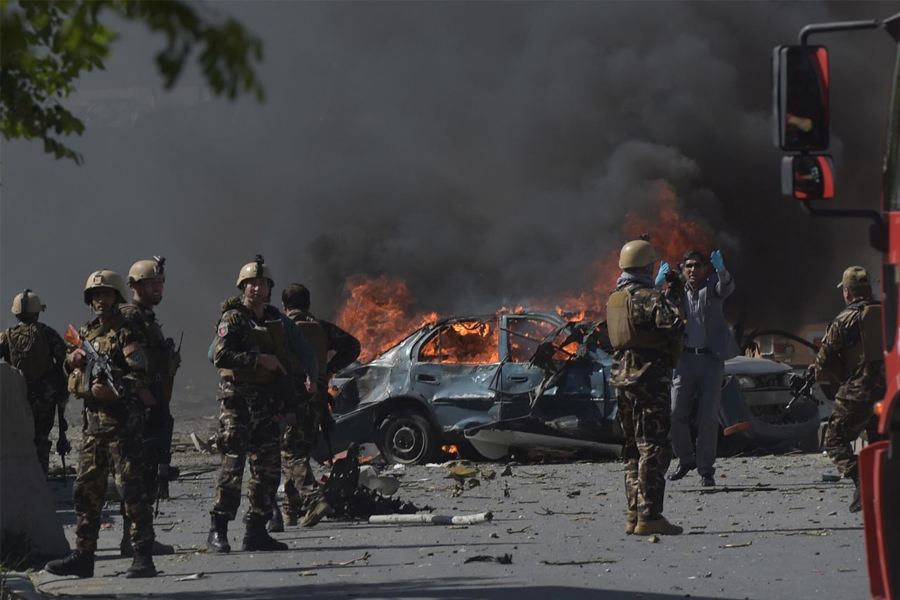
One of the radical recommendations in this evaluation is the issue of historical relics, including the Buddha statues of Bamiyan, and the introduction of mythological figures. Zoroaster, Rostam, Sekander, Kushans and others were mentioned as Godless and fire worshipers. The Taliban believe that such people should not be introduced as good names, instead the teachers should explain the opinions of these people to the students. Also, they believe that including information on the historical statues of Bamiyan is promoting Buddhism. The report states that the teacher should fully explain this belief, which the Taliban believe is ‘ignorant’; instead true Islamic beliefs should be taught.
The committee have repeatedly boasted about the destruction of the Buddha statues of Bamiyan and said that such values should be erased from the minds of students. For the Taliban, the Buddha of Bamiyan is not history, but ‘shame’, and the teachers must emphasize its ugliness in their lessons. These topics are also mentioned in the evaluation of elementary school textbooks. The Taliban have repeatedly said that such values should not be placed in the minds of students. Instead, the teacher must address the drawbacks of idolatry. They have called the historical statues of Buddha in Bamiyan ‘Buddhist values’ which they believe has nothing to do with Muslims. Taliban believe that teachers should refer to the examples of Abraham and Mohammad destroying idols, and inform students about the evils of idols and their destruction, referring to the Taliban’s destroying of the Buddha statues in Bamyian.
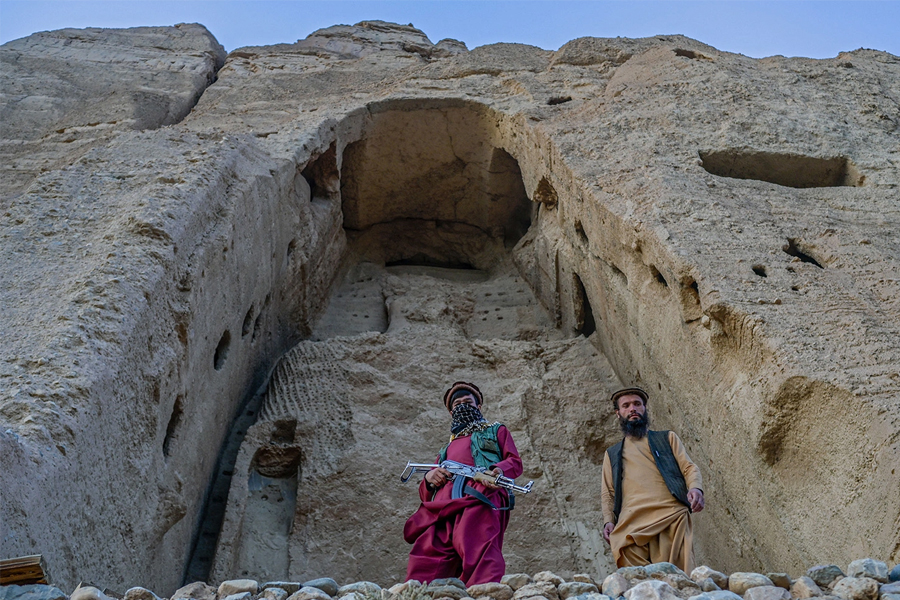
In this revision, the committee has objected to topics related to special holidays, ceremonies, and vying poetry in the education curriculum. According to this committee, teachers should explain to students that the Islamic law has guided Muslims to celebrate Eid as a happy day. According to the Taliban, the celebration of Nowruz, the Samnak picnic, and the Picnic of Red Roses are forbidden and should be avoided. The Taliban have only allowed mushairah – vying poetry- if it is not ‘gambling and immoral’. It is not clear what the Taliban’s definition of gambling and immorality in mushairah is, because previously, the leaders of the Taliban had also organized mushairah programs on their television channel. The Taliban have also criticized celebrating birthdays and emphasize that it is part of Western customs and should be avoided.
In a part of the Taliban revision committee, it has been mentioned that the topics of the textbooks about music and cinema encourage children to act vile. According to the Taliban, musical instruments depicted in these textbooks are an effort to get students used to them. According to their own definition, the Taliban have called music a ‘forbidden and futile’ act that has no ‘reasonable benefit’. The committee has warned the teachers to teach the religion’s stance on music and change the mentality of the students. In the evaluation of the 11th grade’s history book, they believe that on one hand, cinema, theater, and other arts are not compatible with ‘Islamic teachings’; while on the other hand, they are against human progress.
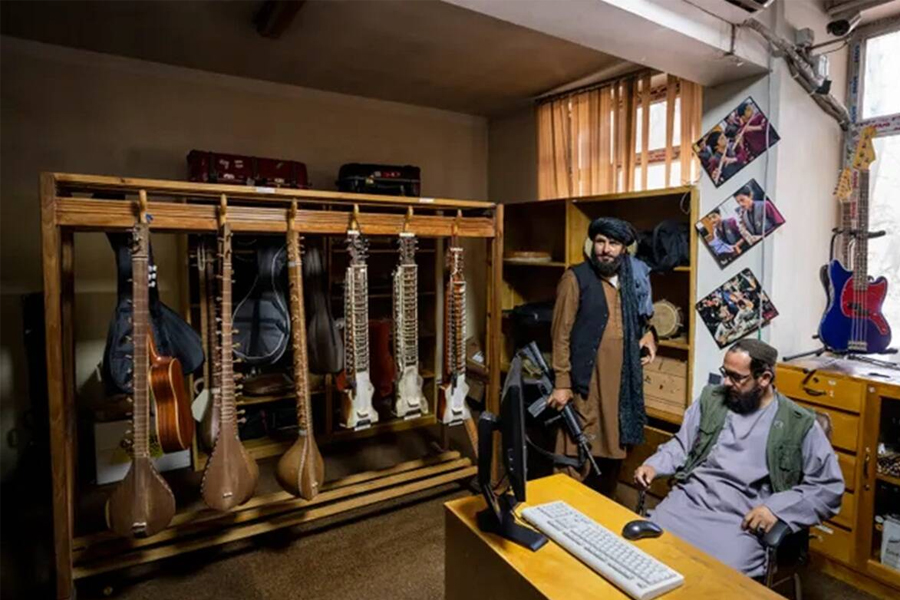
The committee also criticize the nature of finding pests in the textbooks and believe that besides their nature, these pests are a divine test. According to this committee, the teacher should explain the religious aspects of natural disasters to the students. In the geography textbooks, topics such as earthquakes are mentioned under the heading of natural disasters. According to the Taliban, the Quranic and sharia reasons and guidelines regarding these pests should also be explained so that the minds of students are not materialized. It should be mentioned that the Taliban currently call poverty, natural disasters, and life challenges as divine punishment. Previously, the local Taliban authorities had burned people’s house in Northern Afghanistan and called it divine punishment of the wicked.
In addition, the committee believes that in all physics and physical developments topics such as weather, sun and other things, sharia theories should also be mentioned. They have called the purpose of pointing out these issues to try to prevent students from becoming materialistic.
The committee criticize the textbooks that mention the importance of population reduction. Population management is mentioned in the sixth grade social science book under the title of living environment. The Taliban have called such a view ‘infidel belief’. The Taliban believe that Muslims should not worry about clothing and feeding children, because God provides for them.
Also, the 4th grade science textbook gives information about AIDS and hygiene. The committee believe this disease to be a gift of democracy, and state that before Westerners came, such diseases did not exist in Afghanistan. According to the Taliban, this disease has spread throughout the country after the presence of such people [an implicit reference to the politicians who came to the country from the West].
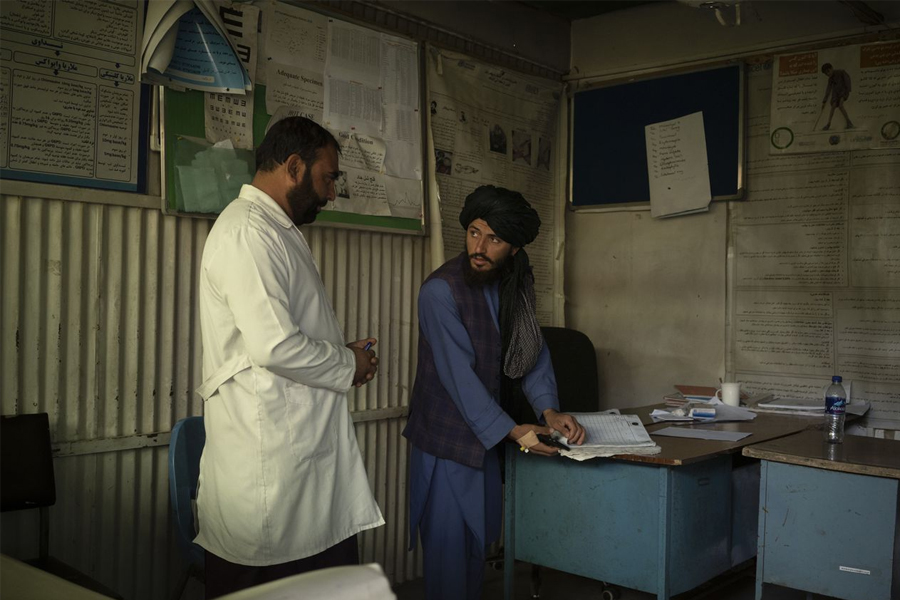
Another case is the issue of tithe and jizya collection, which according to the Taliban, the existing curriculum interprets it as finance. The Taliban committee consider this to be the result of the Western economy. According to the Taliban, tithe, zakat, kharaj and jizya are the fair parts of the Islamic economic system. Also, the Taliban believe taxes collection to be ‘collection of illegal wealth of oppressive regimes’. It should be mentioned that the Taliban, considering their financial instability, in addition to receiving international aid, have tried to comprehensively collect both of the above cases. Another case is insurance, which the Taliban believe should be prohibited, and have asked the teachers to teach students about its sharia ruling.
Human Rights Denial: Women Are the Intended Target of Taliban Ideology
The Taliban have removed all topics related to human freedoms in school curriculum. According to the Taliban, the concept of freedom has been misused in the education curriculum and the goal of freedom is only ‘unrestricted freedom’, which in their opinion, are adapted from the standards of democracy. The Taliban have said that the standards of human rights in the education curriculum should be explained only from the perspective of the Taliban’s religious interpretation, as they believe the western world is ‘violators of human rights’. It is also reminded that when the 7th grade Dari textbook says ‘every human being is free under the light of the law’ its Sharia limitations should also be mentioned. Likewise, the Taliban have emphasized on the implementation of Had and Qisas punishments, including limb amputation and stoning. They believe that under the pretext of dignity and equality, sharia rules and regulations should not be negated. In addition, the Taliban demand to erase the pictures related to the elections in the curriculum and emphasize that the evils of this process should be told to the students.
Another issue for the Taliban in revising the curriculum is women and their rights. The revision committee has reacted to this problem in every case. In two cases, members of this committee read stories in the textbooks that encourage women to leave the house; they emphasize that the necessity of going out fully covered should be emphasized in the same lessons. Regarding women’s work in schools, hospitals, factories and government offices, the Taliban have said that the limits of women’s work conditions for education should be defined from an Islamic point of view. In addition, the committee also criticize the story of a girl who works in an office, stating that the framework of women’s work should be expressed not beyond Islamic principles. The fact is that according to the Taliban, women cannot work in any of these places, except for the cases that the group itself sees the need for. Moreover, the right of women to choose has been challenged by this committee. According to the Taliban, teachers should explain the Islamic rights of women and the legitimacy of elections at the same time.
In some cases, duties beyond housekeeping for women have been criticized by this committee. Even in some parts of the curriculum evaluation, it has been said that the Taliban’s restrictions on women’s travel should also be included. Likewise, the Taliban believe that the existing curriculum teaches the role of women in contemporary literature, this is an encouragement towards western culture. According to the Taliban, this work is against the principles and limits of sharia and these limits should be pointed out to the students.
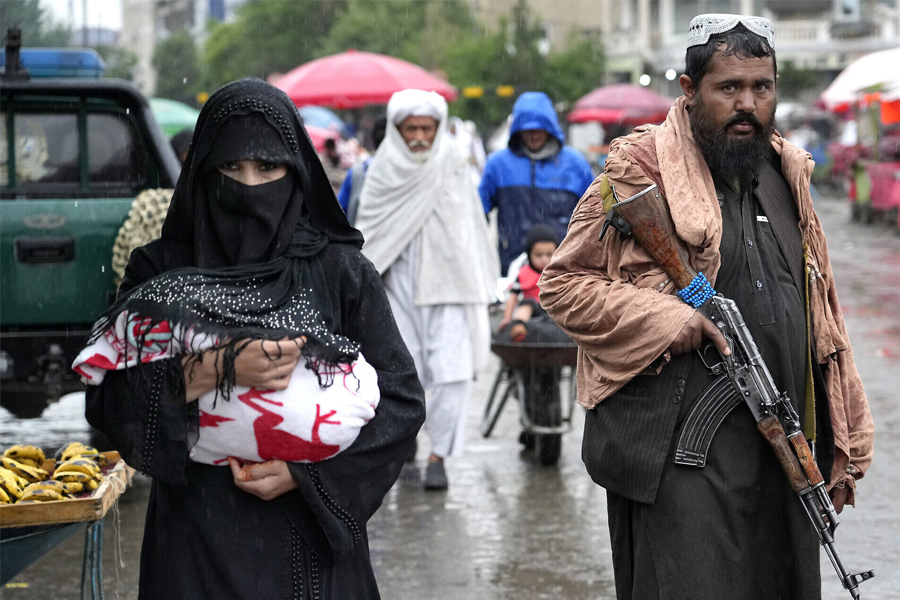
A serious debate regarding women is forced marriage. In this regard, the Taliban believe that subjects related to marriage should be revised in the curriculum. However, the Taliban consider the marriage of an underage boy or girl to be legitimate on the condition of their father’s consent. This is despite the fact that according to the principles of Islam, marrying underage girls is prohibited. It is worth mentioning that child marriage is common among the Taliban. In fact, they are trying to make it more common by including the legitimacy of marriage of underage girls in the curriculum.
Another issue is the discussion of women’s education. The committee limits the right to education to the rule of presumption of objectivity and sufficiency, according to which, education of religious sciences is presumption of objectivity and education of modern sciences is presumption of sufficiency. In their evaluation, the Taliban state that women’s education has been misused in the curriculum, because its conditions and limitations are not mentioned in the hadiths. According to the committee, the teachers should remind the students that women are obliged to acquire knowledge under what conditions. According to the Taliban, in the hadith “seeking knowledge is mandatory for every man and woman”, the principles of sharia should be explained for women. This way, the Taliban try to limit women’s education to elementary education and religious sciences under the pretext of sharia law.
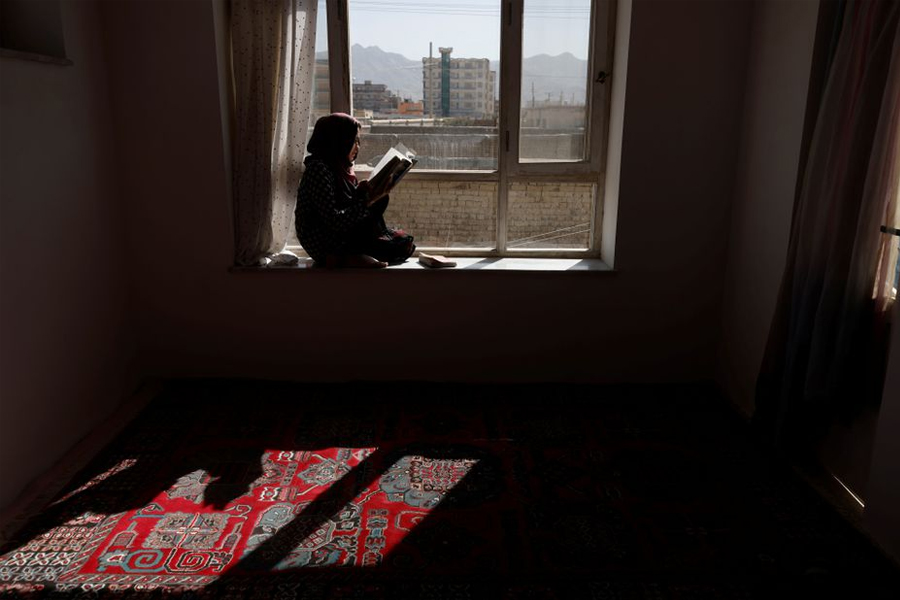
In one case, the Taliban committee even criticize the comparison between educated women and housewives. They state that in the curriculum, educated women outside the home were given points compared to women inside the home, and they were encouraged to go outside through education. The Taliban have specified that the teachers should teach the Sharia principles of women’s education according to the Taliban’s ideology.
Arguments against Democracy and Removal of the National Anthem
In the modification scheme suggested by the Taliban committee, part of their focus is on the rule of law and democracy in the curriculum. After assessing some textbooks, the committee suggest that the Constitution was drafted ‘under the shadow of B52’ and teachers should warn their students about it. In the opinion of the Taliban, the interpretation and compilation of the constitution should be done from the perspective of Islam [in respect with Taliban’s viewpoints]. It has also been said that most of the articles of the constitution of the former governments are not compatible with Islamic principles and the Taliban viewpoints. According to the Taliban’s proposal, teachers should also explain the importance of an Islamic regime, and remind them of what the Taliban called believe are ‘constitutional shortcomings’. Besides, the Taliban have said that in the texts related to the government, there is a worldview and the teacher should teach the students the value of Imamate and Emirate instead.
The next controversy is about the constitution. The Taliban suggest that this law is based on western standards, and this should be reminded it to students. They also believe that ‘deficiencies and disadvantages of republic and democracy’ should be taught to students. The Taliban also question the legislative body of the parliament, saying that this council can never take the place of the Ahl al-Hall wa’l-Aqd or the Islamic Council. According to the order of the Taliban, the dignity and competence of the Supreme Council must be taught to the students in the curriculum.
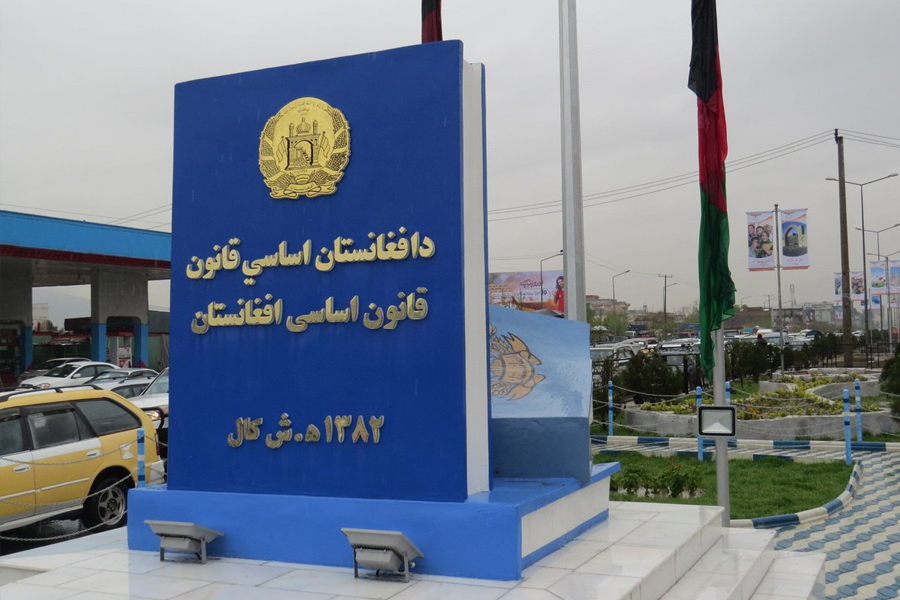
The Taliban committee has also made suggestions and recommendations for revising the curriculum on issues related to media. In revising the content of 4th grade Pashto textbook, the Taliban have referred to radio as ‘colonial media’. The Taliban only mention Radio Azadi and call its work ‘mischief’ and ‘wickedness’. This issue is raised while about two years after this assessment, the Taliban have stopped the activities of Radio Azadi in 13 provinces across Afghanistan.
In the comments on the social science textbook of 4th grade, the Taliban call media reporting that challenges the group’s performance as ‘false propaganda’ and that should be prohibited. According to the committee, the use of television is good heresy and its side effects should be explained. According to them, teachers should explain the harm of multiple media and their role in publishing negative advertisements to the students. The committee believes that religious scholars should be honored as those who have worked hard for the true press.
In addition to media, the Taliban have also made suggestions about the Internet. According to the revision committee, in 4th grade’s social science textbook, teachers should inform students about the dangers of internet, and try to prevent them from using it.
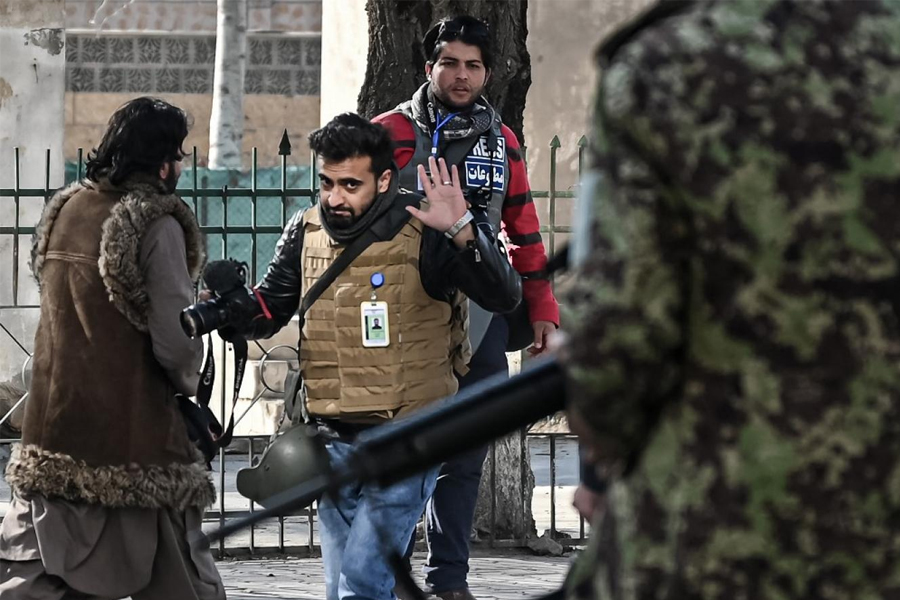
Promoting pessimism and skepticism toward former soldiers is another point that the Taliban emphasize in the revised curriculum. In the revision of the social science textbook for 4th grade, former soldiers are described as ‘slaves’. The committee mentions that these soldiers were trained to defend and sustain the presence of other countries. The Taliban have implicitly called their fighters real national forces, because according to the Taliban, they have been trained with “Islamic, Jihadi and Afghan spirit”. Furthermore, the Taliban criticize the former police being praised, and believe that instead of doing so, the cooperation of the former soldiers with the Americans should be mentioned as ‘enmity with people’. The committee has asked teachers to provide information on how to protect the country while condemning the actions of the U.S. and the former military.
Taliban also insist on removing the national anthem from the curriculum. At the beginning of all textbooks, the national anthem is mentioned, and the committee suggest that the national anthem of the Islamic Emirate should be sung instead. Because according to them, Islamism, jihadi courage and the bravery of Afghans are all in this song. In the evaluation of the Pashto textbook for the 2nd grade, it is said that teachers should memorize the song of the Taliban in addition to the Ma’arif (education) song.
Extreme Historic Figures Condemnation
In the revision of the curriculum, the Taliban’s viewpoints on the history, politics, and culture of Afghanistan is also extremely exclusivist. The revision committee speak harshly about some politicians, writers, and public figures. Their biggest objection is Amanullah Khan. The Taliban mention him several times in their review report in a harsh tone and emphasize that teachers should teach Taliban’s perception of him. The Taliban have called Amanullah Khan a ‘traitor’ who, surrendered a part of the country’s territory beyond the Durand Line to the British in the Rawalpindi-Kabul agreement. They believe that the agreement between Rawalpindi and Kabul should not be interpreted as peace talks.
In addition, Dawood Khan, and Dr. Najibullah, the former presidents of Afghanistan, Bayazid Roshan, Faiz Mohammad Kateb, Ghani Khan, Mahmoud Tarzi, and Sulaiman Laeeq are also condemned. The Taliban call Dr. Najibullah a ‘communist’ in their report. In the revision of the Pashto textbook for 6th grade, they state “Under the title of the song for the homeland, there is a poem by the communist Sulaiman Laeeq [Afghan poet and politician]. Teachers should inform students about the atrocities of the communists and their false ideas and beliefs and teach the song of the Islamic Emirate about the country.”
In several cases, the revision committee react to the name of Ghani Khan, a famous Pashtun poet and politician, and write that his words and opinions are illicit. In the Pashto textbook for 12th grade, it is also stated that teachers should explain the ‘negative thoughts and corrupt ideas of Ghani Khan’. This issue has also been clarified in the evaluation of the 7th grade patriotism textbook about Faiz Muhammad Kateb, a writer and historian of Hazara origin: “Here, a Shiite named Mullah Faiz Mohammad Kateb, who was a member of the constitutional movement, has been introduced. The teacher should explain to the students the corruptions of the constitutional movement (which was originally a royal class and western republic).”
Furthermore, according to this committee, Mahmoud Tarzi, an Afghan writer and politician, is depicted as a great person in a textbook for 8th grade. They emphasize that the teacher should explain his ‘intellectual shortcomings’ to the students. They have mentioned Mohammad Tarzi as a ‘supporter of the West’. Dr. Yusuf, a former prime minister of Afghanistan is mentioned in the existing curriculum as the founder of democracy in Afghanistan; by revising the curriculum, teachers should teach the evils of democracy and democrats. Shah Mahmoud Khan, another former prime minister is also condemned, “He is called the father of democracy. Khalq and Parcham, two leading communist parties in Afghanistan, and other parties were built based on the order of this unfortunate person. In this lesson, evils of democracy should be explained to students.”
They continue stating that the national and historical figures of Islam and Afghanistan have been ignored in the history textbooks, and instead, western and blasphemous figures have been introduced to students. Moreover, based on this evaluation, by exaggerating the praise of some personalities, including Amanullah Khan and Dawood Khan, the existing curriculum overlook their negative and non-Islamic performance and depict them positively. On another note, the committee asserts “the positive aspect of the Taliban, which brought national unity, security, and the Islamic system with them, and ultimately saved the country, has been overlooked.”
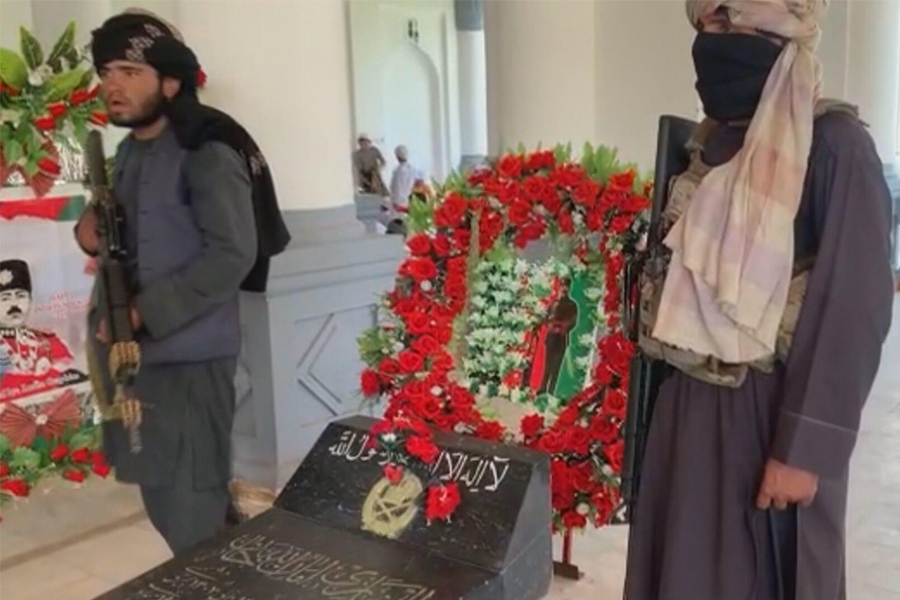
According to all these cases, it can be said that the Taliban intend to teach history subjects not based on what actually happened, but according to their order and ideology.
Highlighting the Progress Made in Islamic World and Denying Others’ Achievements
In this document, the Taliban emphasize that school lessons should be focused on issues related to the Islamic world. Members of this committee believe “The world is described intellectually in geography and history textbooks in such a way that our future generation will remain ignorant of the past, present and future state of the Islamic world. The role and importance of the Islamic world in the international economy is left ambiguous. Students should learn the importance of the geography of the Islamic world and its politics, economy, etc.”
In addition, the Taliban suggest that the progress of Muslims and the importance of the Islamic world have been ignored by the existing curriculum, and efforts have been made for “nationalism” instead of Islamic brotherhood in Pashto subjects. According to them, there is no trace of “Islamic Brotherhood” in these textbooks, which on the one hand keeps students unaware of this important issue for the Taliban, and on the other, develops the idea of nationalism in their minds. Even the Taliban criticize the division between Arabs and Afghans in one of the lessons related to the rise and spread of Islam in Afghanistan and called it fueling nationalism.
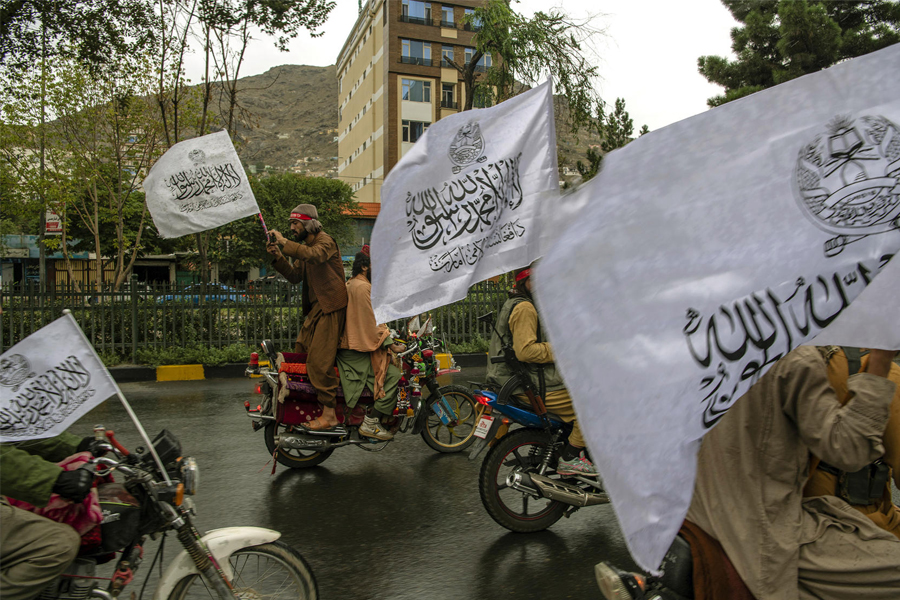
Furthermore, the committee object the judgment about the historical periods after the Caliphs of Islam. They have suggested that listing the appointments of Arab rulers as the cause of the uprising against the Umayyad caliphate is a form of fueling nationalism. According to the Taliban, including historical issues in the curriculum in this way promts students to think that appointments in the Islamic system are based on personal relationships. The committee has asked teachers to explain these things to the students during the lessons. They object these issues while the appointments in the Taliban government are also based on personal relationships and affiliations with the Taliban.
The committee criticize a part of the Dari textbook for 9th grade about encouraging the unity of Muslims, without differences and wars with other communities, and state that the value and necessity of the unity of Muslims to fight against the infidels should also be highlighted in this lesson. Reviewing these revision and suggestions, it can be clearly understood that the Taliban seek to cultivate an ideology that is in conflict with other religions and cultures.
Another issue for the Taliban is the introduction of the Gregorian date in the 7th grade history textbook. They question that why the Hijri calender is not mentioned in the book, nor is there any mention of it being the starting point of history. They believe that by including such a topic (the Gregorian calender) students will think that only westerners are a part of civilization. In this context, it has been suggested that in such cases, historical periods before and after Islam should also be mentioned. The Taliban call this a form of ‘cultural invasion’ emphasizing that teachers should explain all three dates [Gregorian, Hijri, and Solar] and explain the importance of Hijri date to the students.
They have called the inclusion of famous figures (western, Indian and other scientists) in the existing curriculum against Islamic culture and an attempt to promote blasphemy. The committee members object that there are few mentions of Afghan poets and scholars of the Islamic world in textbooks; and if there are any, they are either women poets or Pashtun nationalists. In addition, it has been said that most of the non-Muslim poets are also westerners, and including their words or information in the school curriculum is a betrayal of Islam and Afghanistan.
In these evaluation, any information about foreign authors has been sharply criticized. For instance, the committee members have criticized Thomas Edison, the famous inventor, describing him as an American and refusing to mention his name as one of the greates inventors of human history. This issue is raised while people, including the Taliban, widely use Edison’s inventions and their products, including electricity, in their daily lives and completely depend on these inventions. The committee also criticize the inclusion of the names of Hans Christian Andersen, Robindranath Tagore, Johann Wolfgang, Tolstoy, Ernest Hemingway, Laila Sarahat Roshani, Anoushirvan Adel, and Bayazid Roshan in the textbooks. According to the Taliban, scholars such as Ibn Farnas, Al-Khwarizmi, Al-Idris and Omar Khayyam should be mentioned in the textbooks instead of, or alongside such people.
They also insist on the unity of the Islamic world and the Islamic brotherhood, while they themselves have formed an all-male, all-Pashtun and all-clerics government in Afghanistan. The world has called the end of the monopoly of power one of the main reasons for the recognition of the Taliban and emphasize that all ethnic groups should participate in the government. However, it seems that along with the Taliban’s monopolistic view of power in Afghanistan, they have a jihadist view of the Islamic world too.
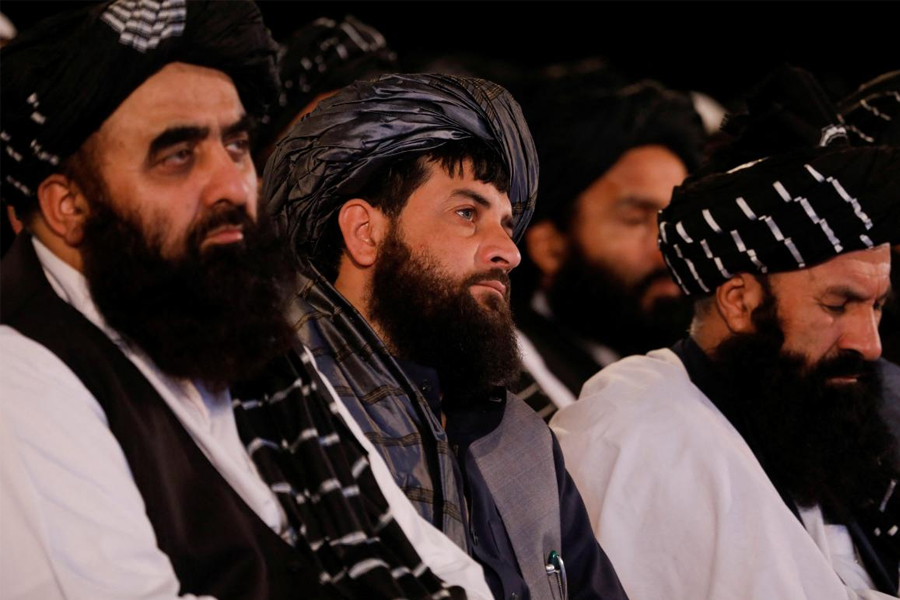
Taliban: Seeds of Hatred for the West Should Be Planted in Students’ Minds
In the revised curriculum, international issues are also discussed that express the Taliban’s worldview. They emphasize on patriotism while maintaining good relations with other countries. The Taliban have said that love for the country has sharia limits and people should consider it. In evaluating the Pashto textbook for 5th grade, it is stated that under the heading of philanthropy, love for all human beings is encouraged. According to the Taliban, non-Islamic beliefs such as this should be prohibited.
The revision committee disagrees with the Hadith titled Hub ul-Watan Minal-Iman – which literally means love for one’s homeland is part of faith – in the 7th grade’s patriotism textbook, even calling the famous poem “Ei Zama Watana de Laluna Khazani Zama, that translates to ‘oh! My homeland, you are the treasure of pearls” written by Ghani Khan as ‘inappropriate words’. The committee assert that Ghani Khan was ‘corrupt’ and teachers should inform the students about his corruption.
The Taliban expect that the historical narratives they want should be included in the curriculum. According to them, the U.S. attack on Afghanistan should be discussed in high school patriotic textbooks. This committee recommends that ‘seeds of hatred against western countries’ should be planted in the minds of students so that they understand patriotism in a real. It is also stated in a part of the draft of the Taliban’s curriculum revision that the textbooks should work on the minds of students about the war against the Soviet Union and Talibans’ war against the United States. In addition, it has been said that in addition to defensive war in the curriculum, students should also be given information about active war and the importance of conducting intellectual war against non-Muslims.
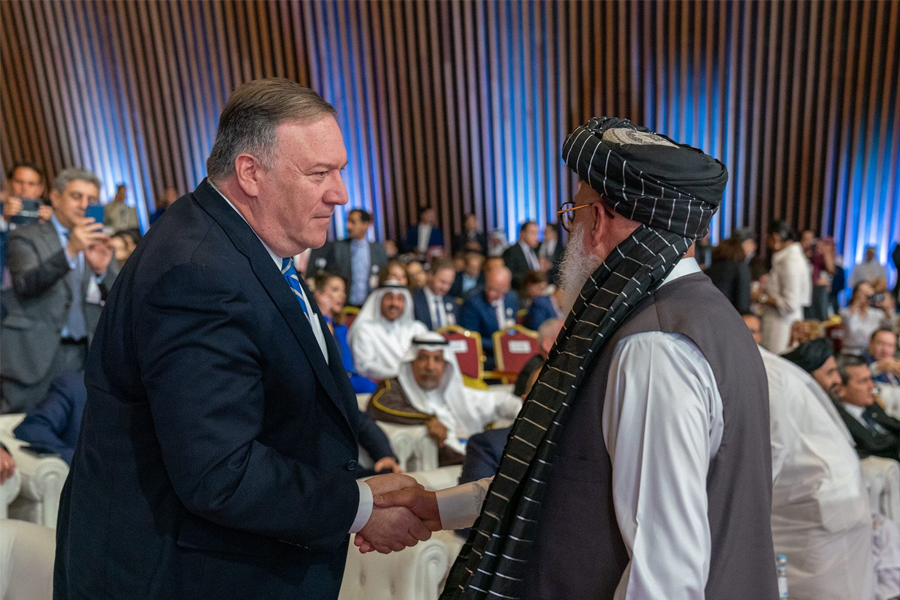
In criticizing 5th grade’s Pashto textbook teacing about the United Nations, the committee calls the UN an ‘evil organization’. According to the Taliban, this organization is evil and students should be informed about its crimes. However, they do not give details about what crimes they think the UN has committed. In another part, while criticizing an article in the Dari textbook for 12th grade, they write that this organization remains a ‘trap’ created by the U.S., Russia, Great Britain, China, and France to entrap the world. They have equated this organization to an ‘infidel net’, which students should be informed about. This assessment has been made while two years later, the Taliban and their regime depend on the money from the United Nations, interacting with this institution from time to time and having received about 1.5 billion dollars in aid in the span of 16 months.
Although the Taliban have pointed out dozens of other things in their assessment; yet the main challenges of its implementation, including book printing and people’s reactions, have not been mentioned. This is the first time that details of the revision of the Taliban’s education curriculum are made public. Nevertheless, they have made efforts to implement their education system. In another report, Hasht-e-Subh has reported in detail the actions of the Taliban in this regard. It should be mentioned that the Taliban had paralyzed the education system during their previous rule and dealt with the curriculum in an ideological way. Although it had a history even before the Taliban, and during the civil war, the school curriculum was compiled with the help of international institutions and Mujahideen. Its main goal was to promote jihadism and antagonism. This included counting numbers with the image of bullets, weapons, and other war tools which were taught to students. It remains to be seen whether international donors will accompany the Taliban this time to develop a curriculum in which hate and hostility are propagated. But it seems that due to twenty years of living in relatively democratic conditions and the media revolution, the young generation of Afghanistan will not easily reconcile with an extremist ideological curriculum.












